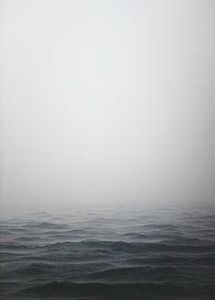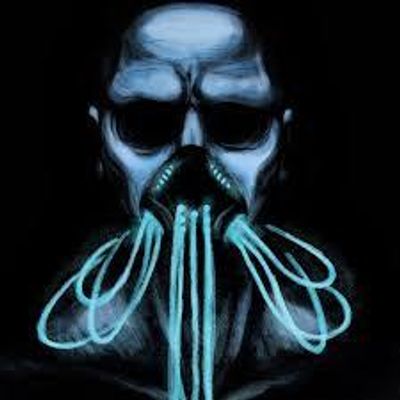Fog

Please read this carefully. If you are an officer or enlisted man in the United States Navy, this is an order:
Scuttle this vessel, immediately. Do not finish this letter. Get off the Mistral at once, and send her down. Consider this a quarantine scenario; all hands are likely dead. God help you if they are not.
We are eight days out of Kirkwall, tracking an intermittent and scrambled distress call from what appeared to be an Icelandic fishing vessel, the Magnusdottir, deep in the no-fishing zone of the North Sea. We found the vessel, or rather, we found a mile wide streak of oil and fragments, the largest of them still burning. The night before, the enlisted man on watch had reported seeing a flash of light on the horizon.
The Magnusdottir's crew was nowhere to be found, except for one lone fisherman, unburned and floating at the far end of the debris field. He had been shot in the forehead with a small caliber revolver. When we fished his pale blue corpse from the frigid water, he was still clutching a fishing knife in one clamped hand. What we were able to piece together from the fragmented and confounding evidence was that for reasons unknown, the crew had been in conflict, resulting in the murder of the of at least one sailor, and the eventual sabotage and destruction of the ship.
Visibility was only a few hundred feet as we spent the next day drifting silently among the debris, in hopes of finding a survivor. The crew was already visibly shaken by the discovery; the grim dread of the fog, and lone smoldering pieces of the Magnusdottir that collided with our hull unsettled even the most seasoned of us. We had expected an easy cruise, and the simple retrieval of a dozen thankful Icelandic fisherman. What we got, at first, was a silent and oil-slick coated sea, a single corpse, and more than a few nagging questions.
The Mistral had just been serviced, after an extended tour with the Atlantic Fleet in Bahrain before her transfer to the North Sea. She was in good running order, so I can only assume that the initial mechanical failure was an act of sabotage, or of some external force. It happened the first night, when our final sweep had been completed, and we returned to the site of the Magnusdottir's first transmission.
There was nothing initially remarkable about the spot, a cold and lonely set of co-ordinates and little else. I was in my cabin, just settling down when the call sounded from the Captain, offering little information, just a stern order to meet him on deck.
Dressing quickly, I emerged from my cabin into a cloud of palpable unease and fear. The enlisted men, and the junior officers were coursing through the ship towards the deck, like panicked rats. No one made eye contact, or spoke. There was none of the usual gallows humor, or camaraderie, that bubbles up in situations of limited information, just a grim inertia that pulled us out into the arctic night.
On deck, the night was unnaturally clear and cold, and the bright of the stars burned in the frosty air. Around us in every direction, just a few hundred yards away, the fog and clouds whorled, as if held at bay by our presence. The Captain was at the railing, leaning over along with the men on watch. I approached him, suddenly desperate and panicked to know what was happening, when I saw it, the light flooding up from beneath us.
The sea was flat, like the surface of a mirror. The water was black, reflecting the pale pinpricks of the stars, but beneath the surface, something glowed with a cold light. Pulsating shapes of violet, green, and deep cobalt blue shone from beneath. They flowed and merged and shimmered silently, deep below the glassy sea.
We stared, two dozen men and women, struck dumb and horrified by the sight. There was a sense of scale that emerged from the fluid movement of the lights; they seemed to be many fathoms beneath us, which would make them terribly large and impossibly fast. There were no solid shapes, and no disturbance of the water, just a deep field of liquid flowing light.
We watched for what seemed like hours, entranced by the mesmerizing ballet of cold light, a mirror reflection of northern lights. When it ended, abruptly, there were three almost simultaneous events. First, the lights seemed to contract, each mote freezing in place and collapsing like the iris of an eye in bright sunlight. Secondly, there was a tremor in the air, that first raised the hair on the back of my neck. As the ghostly lights winked out of existence, it rose in intensity, until I thought my eyeballs might shake their way out of my head. Through the fog of sudden pain, I heard a noise rising above arctic wind, a humming vibration from the Mistral herself, that matched the electric shuddering in my skull.
It was as if every lightbulb aboard the Mistral was suddenly flushed with power, flaring bright and buzzing noisily in their housings, and when the whine had reached a fever pitch, they began to pop and shatter among a shatter of sparks. From start to finish, it lasted less than two seconds, and we were left floating silently in the dark waters, beneath the starry sky, on a dead and crippled boat.
The damage was invisible, without any obvious cause, and total. Nothing aboard the Mistral worked, each carefully crafted system of multiple redundancies had crumbled. Every light was shattered, and even the replacement bulbs, and the small flashlights we all carried held fused and useless filaments. Satellite phones, shortwave radios, all means of communication were useless bricks of plastic and wire. Every battery was dead, every stereo system was silent. We were adrift, without sail or engine, isolated from the world by a hundred miles of black and silent sea.
The crew moved through the ship that first night like moles, fumbling through dark corridors with only a few pale green chemical lights to check each system. They relayed each disheartening message like a fire brigade through the darkness, to where the Captain and I stood on the deck, trying to make sense of the senseless. At last, when nothing else could be done, I fumbled my way back to my cabin, and tried to sleep, the darkness feeling like an oppressive many fingered hand, slowly gripping my chest.
The next morning, I again took stock of our situation, hoping for some fragment of hope we had passed by in the night. The damage was total. We would have to find a way to send a distress call, and hope that we had not drifted too far from our last known coordinates. The men may not have known the full details, but it was clear from their haunted visages that they knew how dire the situation was.
The first death was that afternoon. The sounds of screaming brought me above deck and into a thick heavy fog. High in the gloom, I could see bright burning specks of light, descending slowly. My stomach turned; it was two signal flares drifting uselessly through the haze. Some damn fool had fired the signal flares. I burned with an unfamiliar and foreign rage, and rushed through the fog to the foredeck with hatred in my blood and my fists clamped tight.
The scene that emerged from the fog broke me from my stupor. The enlisted man, a flare gun still in his hand lay broken in a pool of blood. The Captain stood over him clutching the railing, driving the heel of his boot repeatedly into the broken mess of the boy's skull. I realized then that the screaming I heard, the high keening wail was coming from the Captain, his face in a rictus of animal rage. Around them was a small crowd, standing motionless and silent, watching like sentinels.
The Captain turned to see me, and dropped into a crouch, his fingers wrapping around the flare gun and he raised it level with my eyes.
We stared for a long moment at each other, our eyes locked as he panted heavily, his face lightly spattered with blood. The only sound was the wet gurgling exhale of the enlisted man's death rattle, a bubble of blood forming on his ruined face.
I'd served with this man for nearly a decade. This was not the man I knew. This was a hollow simulacrum, filled with violence and terror. I spoke to him then, in a soothing voice I asked him to hand me the flare gun. He said nothing at first, and then spoke, his voice a tiny trembling sound that was swallowed up by the thick gloom around us.
"He's murdered us, Ryan. The fog… the flares will never…"
He shook his head and clenched his eyes tight, as if he were trying to shake himself from a dream. Then he shuddered once, violently, his back arching like a seizure.
"This little f has killed us," he choked out. The flare gun wavered in the air, and I took a step closer, reaching out for him. He opened his eyes and I froze again as we stared silently at one another.
"You're going to die here." He giggled quietly. "I always wanted to watch you die, you fing coward."
He tilted his head back and laughed, one hyena-like bark to the grey sky, and then put the flare gun in his mouth and fired, the last flare igniting and temporarily bathing his head in a halo of magnesium orange and smoke. He tumbled back over the railing. If there was a splash when he hit the water, it was swallowed by the fog.
I stood for what seemed like a very long time. It slowly dawned on me that I was alone, the silent audience having melted away below decks, no doubt taking the grim tale with them. I feared for morale, an absurd concern, I realize now, but could not move from the spot, as if sheer force of will would cause the sea to regurgitate this man, my friend.
The first gunshot broke me from my reverie.
In the emergency lockers, I found that a handful of flare guns remained, and I stuffed one into each pocket, and entered the dim passageway to below deck. Over the hollow retort of gunshots, other muffled sounds began to emerge, the choking sobs, the screams of pain and anger, all bringing the faint impression of the copper smell of blood.
The dark was oppressive and thick as my heart rose in my chest. The pale fading light of the chemical glow-sticks that hung at regular intervals illuminated the bare corridor, and I moved slowly toward my cabin.
It had been sacked, and my service pistol was missing. The next two cabins held the corpses of the junior officers, their broken forms still in their bunks, skulls opened like blossoming flowers under the point blank shots.
I felt the distinct and irrational desire to run on deck and leap overboard, to swim away from the boat into the unknown sea. I gripped a flare gun and held it out ahead of me, less like a weapon and more like a talisman, and began to pace slowly down the corridor, to the enlisted bunks.
The door was wide open, and the smell of blood and fear and shit was nauseating. As my eyes slowly adjusted to the dim, I saw a field of bodies, torn, shredded, and shattered by bullets and makeshift clubs. A few of the men still moved, twitching slightly. I watched in frozen terror as one man, his face a mask of blood and rage, turned up his head to regard me, and with a weak cry of rage, began to drag himself with his arms, trailing a broken and shattered leg, towards me.
From the shadows, another form pounced on him, a boot digging into the wounded man's back with a wet cracking sound. I recognized the attacker's face in the green chemical dim, a quiet and bookish young man. Like the Captain, this was not the man I knew, this was a beast that wore his skin.
He reached down and grabbed the wounded man's jaw, thumb slipping into his mouth. The wounded man growled, a feral mindless sound, and tried to bite down, but his attacker gripped tight, and pulled.
The jaw came off with the sound of tearing tendons and a ululating shriek that vanished into the air.
I was no longer breathing, holding silently at the entrance, but the attacker snapped his head up to see me, nostrils flaring. The jawbone hit the floor with a meaty sound, and he lunged toward me with silent animal grace.
I fired the flare gun, and it hit him square in the chest. His shirt caught fire, and all air escaped his lungs with a sudden forceful exhale, but impossibly, he continued on towards me. As I passed through the portal and slammed the door, the fire had climbed into his hair and he was squealing now, his clawed hands still outstretched towards me.
I felt him impact against the door, and saw that nightmare visage wreathed in fire through the small porthole, lips already burnt away to reveal two rows of perfect teeth. He wailed and began to smash his burning form against the door. Once, twice, three times, and then silence. I raised my eyes to the porthole, and saw only the faint image of the burning shape as it disappeared into the darkness. All conscious thought evaporated and I fled from that charnel house.
I have barricaded all entrances to below deck now, and have doomed myself to slow death at the hands of the enveloping cold. I can still hear the living ones down there, screaming and banging on the doors. They are not the men that I knew. I console myself with this thought, as I leave them in the dark to starve or murder each other.
If you have read this far, and have not fled these waters, or God forbid, are still aboard the Mistral, then I beg you again: Leave now, while you can. Do not look below deck, there are none of us left to save, and certainly none worth saving.
It's cold now, and the fading day surrendering the wan grey light to the dark. There are no stars this night, nothing but the heavy blanket of night. If I could get below, I would find someway, of destroying the Mistral, like the brave men of the Magnusdottir, but it's too late. The most I can make of my last moments, as all feeling flees my extremities, and writing becomes impossible, is a warning.
Please, send us into the deep, tell no one you found us, and never return. There are things and primal desires older than man, and forces beyond the grasp of our simple minds; and they dwell here, beneath the frozen sea.
Join Qfeast to read the entire story!
Sign In. It is absolutely free!



It's really good, but the second chapter...
=O.O=